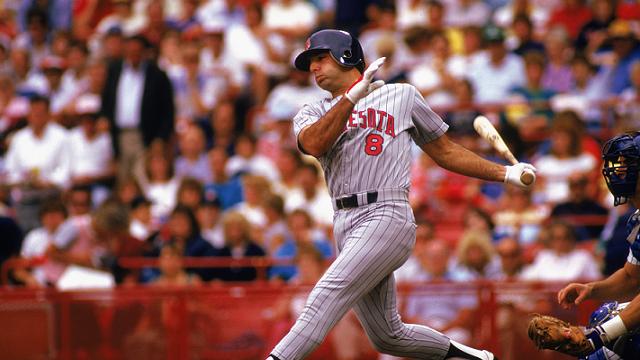MINNESOTA 8, CALIFORNIA 7 IN MINNESOTA
Date: Saturday, April 25.
Batting stars: Greg Gagne was 2-for-4 with two home runs and three RBIs. Gary Gaetti was 2-for-4 with a walk and a home run (his fifth), scoring twice and driving in two. Roy Smalley was 2-for-4 with a two-run homer, his second.
Pitching star: George Frazier pitched 1.2 scoreless innings, giving up one hit.
Opposition stars: Jack Howell was 2-for-4 with a double and two walks, scoring three times. Ruppert Jones was 1-for-5 with a two-run homer and a stolen base. Mark McLemore was 2-for-4 with a stolen base (his third) and two RBIs.
The game: The Twins led 5-2 after four and 6-4 after seven, but the Angels tied it in the top of the eighth on McLemore's two-run single off Jeff Reardon. Gaetti led off the bottom of the eighth with a home run to put the Twins up 7-6, but Wally Joyner's RBI single in the ninth, again off Reardon, tied the score at seven. In the bottom of the ninth, two singles and a walk loaded the bases with one out. It appears that the Angels went with a five-man infield, but Gaetti made it irrelevant with a fly ball to deep center field, getting a single and driving in the winning run.
Of note: Kirby Puckett was 2-for-4 with an RBI, raising his average to .348...Reardon continued to struggle, as his ERA was now 8.22. In fact, as we look at his numbers for the season, it shows how low the bar was set for Twins closers that he was considered a savior and actually got both Cy Young and MVP consideration.
Record: The Twins were 11-7, tied for first with California.
Notes: Al Newman played second in this game, replacing Steve Lombardozzi...Randy Bush was again in right, with Tom Brunansky in left and Dan Gladden on the bench. Have Cory and Dazzle ever talked about how little playing time Dazzle got in April of 1987?...Chuck Finley pitched the bottom of the ninth for California and took the loss. I had not remembered that, for the first two years of his career, Finley was a relief pitcher. He was pretty good in a half-season in 1986, but was not good at all in 1987 and not a whole lot better when he moved into the starting rotation in 1988. In 1989, however, at age twenty-six, he went 16-9, 2.57, 1.27 WHIP. He made the first of five all-star teams that season. He would be a solid rotation starter through 2000, pitching over 200 innings in all but two of those years (and he would have in 1994 if not for the strike--he led the league in innings pitched that season with 183.1). He had a poor year in 2001 but came to pitch fairly well in 2002, going 11-15, 4.15, 1.37 WHIP. He was with the Angels through 1999, went to Cleveland in 2000, and finished with St. Louis, to whom he was traded in July of 2002. He only once received Cy Young consideration, finishing seventh in 1990 when he went 18-9, 2.40, 1.23 WHIP. He was a pretty good pitcher for a long time, and he serves as a reminder that a lot of pretty good pitchers struggle in the early years of their careers.


Thankfully, Reardon was in the closer role, allowing the superior Berenguer to be the fireman (not that Berenguer was amazing, but he was better in 87). In 1987 Reardon did have the best strikeout rate of his career; unfortunately, he also had the worst home run rate of his career. Reardon had several solid years in his career, but also a lot of average ones you would expect from a set-up man, not someone anointed the team's best pitcher.
In the unlikely event that anyone missed it, here's Joe Pos' "The Return of the Fireman," a consideration of John Hiller & recent reliever usage. He wrote a follow-up piece for his personal site, "What the Eck?"
that season by John Hiller is extraordinary. Much like Mark Eichhorn's 1986 season for the Jays.
Reardon's 1987 splits have some high variance – mediocre in the first half, very competent in the second; shut-down against righties, dreadful against lefties – and were pretty far outside his career norms.
I remember those insane splits while simulating the 1987 season one time in Diamond Mind. Asking Reardon to close out a game when a few lefties were coming up was a death sentence.
Yeah, Reardon wasn't exactly the Terminator in '87. If you compare his splits with Aggie's from 1991 – especially R/L and especially especially Late & Close – the difference in the quality of their work is striking. Despite how close they wound up in career saves, Aggie was easily the superior pitcher. Had he been converted a bit earlier (and not pressed into starting in '96), Aggie might've retired with more saves than Eckersley.
Had Eck been converted earlier it wouldn't even be a consideration.
Sure, but Eck broke in as a twenty year old starter and was much more effective than Aggie in that role.
Aggie actually became a closer for the Twins at a younger age than Joe Nathan did (28 to 29).
it shows how low the bar was set for Twins closers
I know how it was set so low. Just sayin'
tell me more
*cries in the corner*
I can't wait for Jeff's replay of the 1984 season
I correctly identified the player with the most career saves vs. the Indians
My memories of Gaetti were of him being a "clutch" player and his career numbers kind of bear that out, although not dramatically. The best example is leverage splits. Low leverage situations: .724 OPS; medium: .747; high: .766.
I just remember him being pretty darn consistent. Bruno was horribly streaky, but G-Man was fairly consistent in my memory.